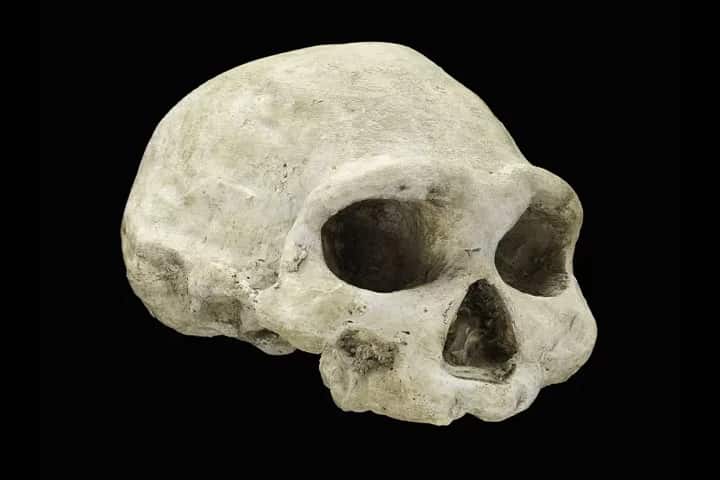

Skull of Homo erectus from the Republic of Georgia (Pic. Courtesy smithsonianmag.com)
Humankind has always been vulnerable to climate change and this became evident as a new study, details of which have been published in a peer-reviewed journal Science, found that western Europe was devoid of hominins for nearly 2,00,000 years thanks to extreme cold that prevailed in the region.
As per a smithsonianmag.com report it was assumed in the past that humans were present in Europe without a break ever since they arrived there a million years ago. Yet, the new research points to a period when they were missing.
Chronis Tzedakis, a palaeoclimatologist at University College London talking to Live Science observed: “There’s an apparent gap of 200,000 years.” And this is when Europe froze. This was deduced by Tzedakis and his colleagues by reconstructing the past climate by analysing a deep-sea sediment core obtained from the coast of Portugal.
This sediment reflected the sea conditions through organic molecules produced by marine plankton while information on vegetation on land was provided by buried pollen grains. Running the data through computer simulations, scientists discovered that 1.15 million years ago, cold age occurred in Europe.
In the eastern Atlantic average winter temperatures dropped by 9 to 13 degrees Fahrenheit as per a statement from London’s Natural History Museum. In a statement, Chris Stringer, a Natural History Museum scientist who co-authored the paper said: “Such a large change in temperature would have hit these humans hard, and they didn’t quickly recover. It would have led to changes in the flora and fauna as well, which could have left these humans with limited food options. Smaller cold stages later on would have delayed any recovery further, meaning that western Europe was probably depopulated for a long period of time.”
Homo erectus were probably the first hominids to arrive in Europe from Africa. Their presence is revealed by their fossils and stone tools that date to around 1.8 million years ago and were unearthed in Georgia. Likewise proof dating to about 1.4 million to 1.5 million years ago have been found in Italy and southern Europe and to about 1.2 million years ago in Spain.
The cold conditions around 1.15 million years ago forced early humans to leave while others died. Humans returned to Europe between 850,000 and 950,000 years ago. They were possibly the more advanced species Homo antecessor who were likely to be more resilient to the cold.
The reason for the cooling was probably the melting of an ice sheet that covered the Arctic and parts of North America and Europe. This increased the freshwater which weakened a vital ocean current called the Atlantic Meridional Overturning Circulation by up to 95 per cent. Scientists predict this weakening could occur again in this century due to climate change.
Summing up the study, Michael Petraglia, a palaeoanthropologist and Director of the Australian Center for Human Evolution at Griffith University remarked: “The environmental, fossil and archaeological evidence are in good agreement for regional abandonment and perhaps even the extinction of early [human] populations. This is a story of how climatic variability had profound effects on hominin populations in the past, with implications for all of humanity today who face extreme weather events and changes in ecosystems.”
Petraglia was not part of the study.
Also read: How climate change triggered attacks on Romans by Attila-led Huns
Germany has come out resolutely behind India and its fight against terrorism under Operation Sindoor.…
Baloch leader Mehran Marri has accused Pakistan of unlawfully occupying Balochistan since 1948, transforming the…
The Trump administration announced on Wednesday that it will continue its efforts to prevent advanced…
External Affairs Minister S Jaishankar met with German Chancellor Friedrich Merz in Berlin on Friday…
The Central Tibetan Administration (CTA) launched a Month-long Panchen Lama Awareness Program aimed at educating…
India's Ambassador to Russia, Vinay Kumar, on Friday, briefed the all-party parliamentary delegation, led by…